“All the things you can find in Grandma’s old wooden chest! Kerchiefs with colorful silk embroidery, velvet bodices with golden flowers! Silk dresses! She wore them in her youth!” So goes the story “The Chest” by Bulgarian writer of the past Dora Gabe. It changed the children at Grade 2 of Vela Blagoeva Secondary School in Veliko Tarnovo. These are the first bunch of kids working on the project “Come to school, tablet in hand!”. It is intended to develop 21st century skills through inter-disciplinary project-oriented education and learning with no textbooks. The topic offered to the kids is “My Bulgaria”. While class teacher Darinka Petrusheva is considering how to approach the subject, the students looking at the illustration to the story in the book, realize that they have seen such treasure chests at their grandparents’ houses in the countryside. Then the idea sprung, for a “Discovery mission”.
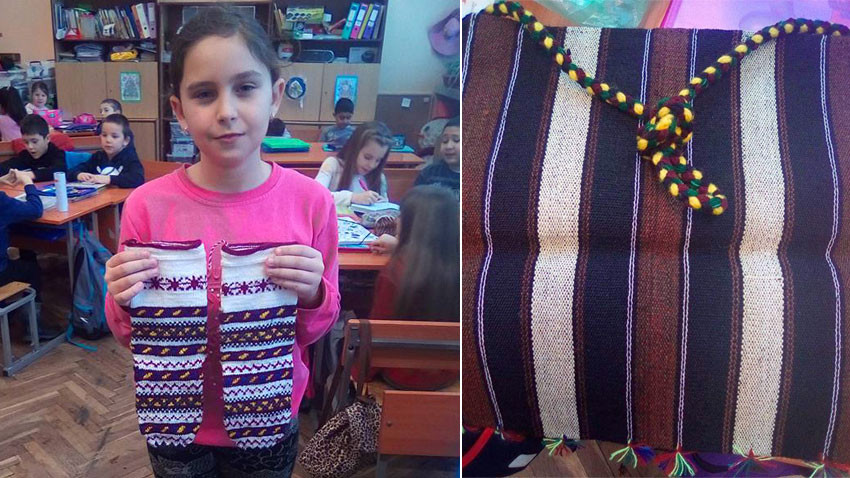
“I decided to challenge the kids to open those old chests and see what they contain; to discover objects and traditional clothing related to the past of their families”, Darinka Petrusheva explains. “I didn’t expect they would bring so many things, that they would discover beautiful objects more than 100 years old!”
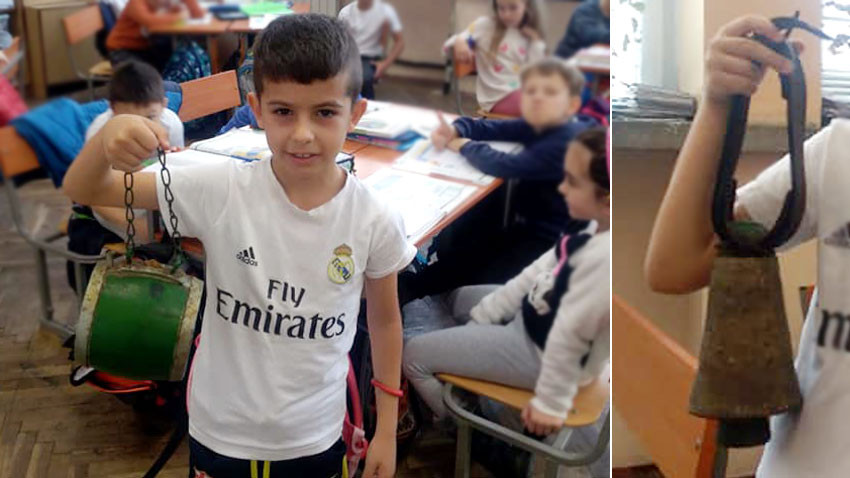
Almost all kids discovered and brought to show beautiful old traditional costumes from different parts of Bulgaria, cattle bells, wooden flasks for water, silver belt locks we call in Bulgaria Pafti, embroidered woolen socks, old coins, pocket watches, jewels, traditional moccasins made of swine skin (the Bulgarian word is Tsarvuli), kits for spinning wool and wooden boxes for jewelry, among others.
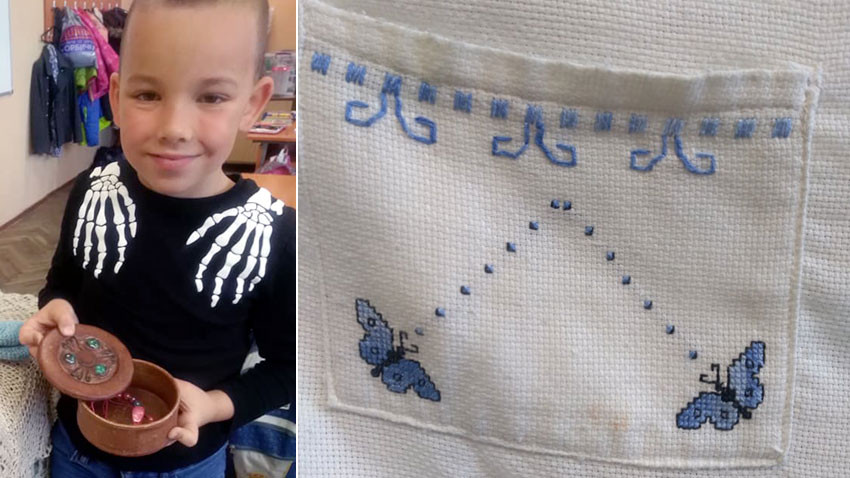
“We are divided in groups and we work in teams. We have a multimedia system in the classroom and we are expecting to get our tablets. We are searching information in the Internet on the subject we have been set and we are getting down the most important things”, says 8-year old Alex. “From my grandparents’ chest I have brought a jewelry box, woolen socks and a brush-holder – it is an embroidered textile bag made to be placed on the wall and designed to have clothes brushes placed in it. It also has a pocket to keep needles, thread, scissors and other sewing materials.”
Katerina, on the other hand, has found in her granny’s old chest table cloths embroidered in silk.
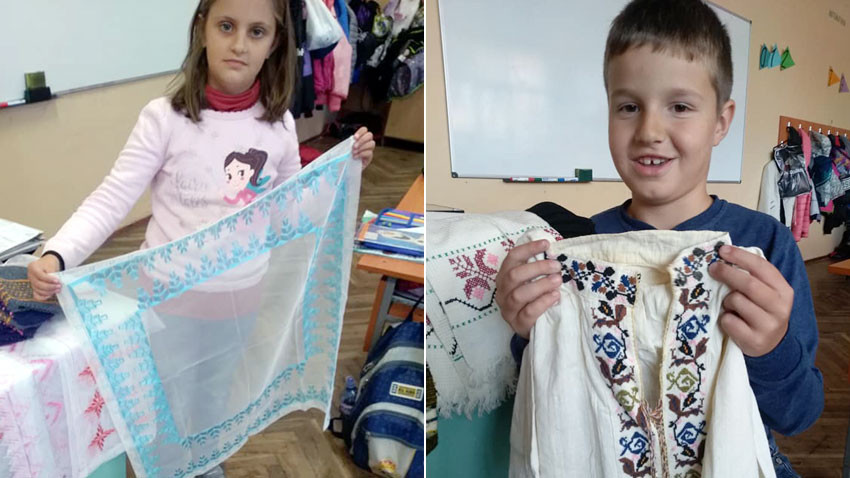
“When my mother was a child, my grandmother taught her to embroider small decorative table cloths. They can be place in different place in the house. There are various stitches and patterns depicted on them. Now my grandmother is teaching me to embroider. For the time being I am learning on small pieces of tapestry.” Katerina told us.
With the help of granny and mom, Villislav has discovered a very old traditional garment.
“The traditional costume I demonstrated is from the Pleven region, northern Bulgaria. It is hand-woven and is more than 120 years old. It is made in the darker colors typical for this part of the country. The Pleven costumes are among the oldest ones in our country. In our family there is a tradition of passing this garment from mother-in-law to daughter-in-law. This tradition continues to our days”, Villy tells us proudly.
The enthusiasm of the children passes onto their families.
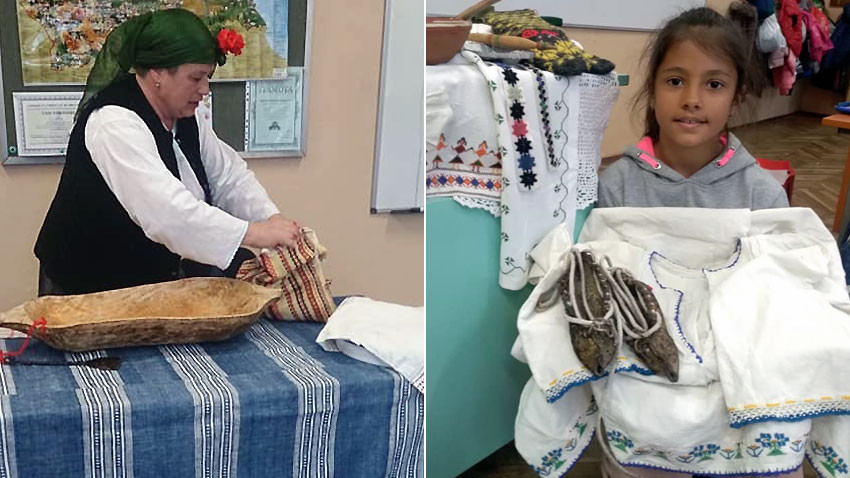
“In December my grandma came and showed to our class how to make a festive round loaf of bread in the traditional way. After that we all made a small figure out of dough to decorate the loaf; and then we baked it”, Denny told us.
“My mother told us the story about Trifon Zarezan, about grape picker Kina Garbova, who is the first woman in this country to have appeared on the old 2-Leva banknote”, Nikol joins the conversation. “And in grandma’s old chest I found hand-woven socks and small table cloths, which were very beautiful.”
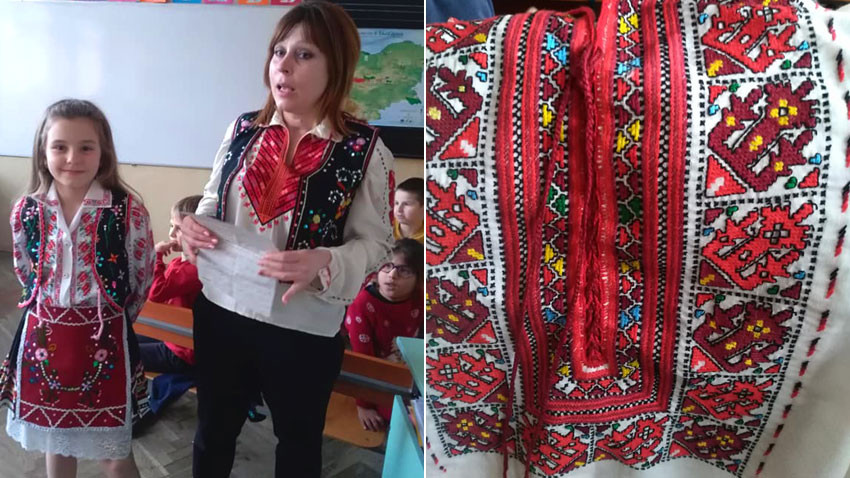
By the end of the project all items the children found and brought to demonstrate will be arranged in an exposition. Furthermore, the kids will be making their own small chests, to collect everything they have created throughout the year. For the time being these chests contain hand-made greeting cards, a map of Bulgaria, portraits of Bulgarian enlighteners and historic figures. They also keep there cards on which they write what they intend to do for becoming better people.
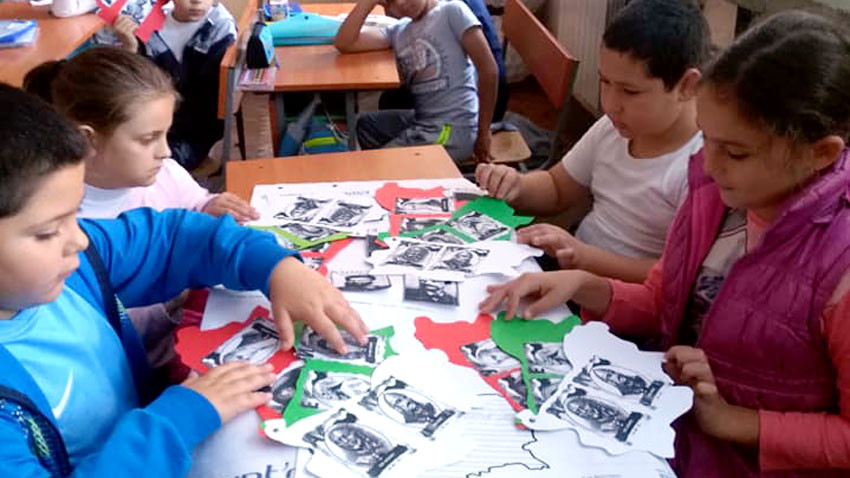
Which is the most important lesson the children must learn?
“”To value what comes form our fatherland, the hold in high esteem their family, to have good knowledge about Bulgaria, and not just wait for someone to tell them from outside. They should find out for themselves, out of personal experience, what theiroland means to them”, teacher Darinka Petrusheva concludes.
English version: Iva Letnikova
Sugar artist Mariya Ozturk's latest masterpiece - a model of St Peter's Basilica in Rome - prompted us to reach out to our fellow Bulgarian during the bright holiday season. Though she’s been straddling life between Bulgaria and Istanbul for years, she..
The Bulgarian-American Cultural Association “Rosa” in Atlanta invited our compatriots to celebrate Easter today from 1:00 p.m. local time at Pinkneyville Park, Medlock Pavilion (the large pavilion) 4758 S Old Peachtree Rd Norcross, GA 30071...
Artist Vanya Petkova from Kardzhali paints non-traditional icons, depicting saints on ostrich eggs . She started about 15 years ago with images of Jesus Christ and the Virgin Mary. The first egg she painted is still intact and is kept by her relative...
International Labor Day on May 1 in the mass consciousness of Bulgarians is often associated with the period of socialism and the grandiose demonstrations..
This evening, at 6pm, a prayer service will be held in the courtyard of the Great Basilica, followed by a festive concert dedicated to the 1160th..

+359 2 9336 661
